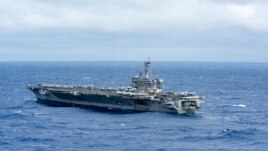17 April, 2017
U.S. Vice President Mike Pence has warned that the United States has not ruled out using military force to deal with an increasing nuclear threat from North Korea.
He spoke of recent U.S. military strikes in Syria and Afghanistan as evidence of President Trump's "strength and resolve."
The warning came as Pence visited South Korea at the start of a four-nation Asia trip. He spoke during a joint appearance in Seoul with South Korea's acting president, Hwang Kyo-ahn.
Pence urged the U.S. to move away from a previous policy of what he called "strategic patience." He said this policy had failed to produce lasting progress with North Korea.
"For more than two decades, the United States and our allies have worked to peacefully dismantle North Korea's nuclear program, and alleviate the suffering of their people. But at every step of the way, North Korea answered our overtures with willful deception, broken promises and nuclear and missile tests."
Pence noted that during the past 18 months, North Korea had carried out two nuclear tests and more missile tests than ever before.
Kim Jong Un's government conducted its latest missile test on Sunday, just before Pence's arrival. The test failed when the missile exploded shortly after launch.
Stopping a North Korean nuclear missile
While Vice President Pence is in Asia, he is expected to seek support for increasing pressure on North Korea to end its nuclear and missile development programs.
"All options are on the table," Pence told reporters at the Demilitarized Zone (DMZ) that separates North and South Korea.
However, U.S. National Security Adviser H.R. McMaster said he is not currently considering a military option. On a TV news program, McMaster said U.S. officials are aiming to contain the threat peacefully.

U.S. President Donald Trump has pledged to stop North Korea's stated plans to develop a nuclear missile capable of reaching the United States. The U.S. Navy recently sent a strike group, led by the USS Carl Vinson aircraft carrier, to waters near the Korean Peninsula as a show of force to North Korea.
The Trump administration is reportedly considering new economic restrictions on North Korea. These could include an oil embargo, a global ban on its airline, stopping cargo ships, and punishing Chinese banks that do business with North Korean companies.
Other players in the area
China remains an important partner for the U.S. on North Korea. But Chinese officials have not supported strong measures against North Korea, which is a close ally of China. Those measures could cause instability at China's border and increase U.S. power in the area.
A Chinese Foreign Ministry spokesman called for restarting multi-party talks that ended without agreement in 2009. He also spoke out against deploying the THAAD missile defense system in South Korea. Both Pence and Hwang repeated their support for THAAD as a way to protect against North Korean missile strikes.
In Tokyo, Japanese Prime Minister Shinzo Abe said a "diplomatic effort is important to maintain peace" on the Korean Peninsula. But he said "dialogue for the sake of having dialogue" is useless.
"We need to apply pressure on North Korea so they seriously respond to a dialogue," Abe told a parliamentary meeting. He urged the international community, especially China and Russia, to play a bigger role in the issue.
I'm Bryan Lynn.
Bryan Lynn wrote this story for VOA Learning English, based on reports from VOA News, the Associated Press and Reuters. Kelly Jean Kelly was the editor.
We want to hear from you. Write to us in the Comments section, and visit 51VOA.COM.
________________________________________________________________
Words in This Story
resolve – n. determination
patience – n. being able to wait a long time without becoming annoyed or upset
dismantle – v. take something apart or completely get rid of it
alleviate – v. reduce the pain or difficulty of something
overture – n. something offered with the hope that it will improve a relationship, agreement, etc.
deception – n. act of making something seem true that is not
embargo – n. a government order that limits trade in some way
dialogue – n. discussion held between groups in attempt to come to an agreement